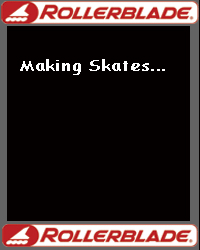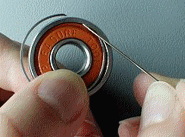 |  |  | ||||||||||||||||||||||||||||||||||||||||||||||||||||||||||||
| ||||||||||||||||||||||||||||||||||||||||||||||||||||||||||||||
Pleasure Tool Interview: Part II Pleasure Tool Man, Ed Lynn, Gives the Whole Skinny on How to Service Skate Bearings (By Robert Burnson) Robert: Why is it necessary -- unless you constantly replace your bearings with new ones -- to perform regular maintenance on them? Ed: Well, when you hear what I call "the crunchies," that means you have dirt, sand and road grime in your bearings. And if you leave it there, it will slow down your wheels and wear down the metal in your bearings, causing them to get loose and eventually to fail. In a nutshell, the reason to keep the bearings clean is for the sake of performance and longevity. Robert: How can you tell when it's time to service your bearings? Ed: You know it's time when you spin your bearings and you hear noise. Sometimes the noise is due to the bearings being dry. The lubricant used in your bearings may have been a thin oil that was flung out of the bearings, and so now they are just a little dry and you can hear that. That's not serious. Possibly re-lubing is all you need, although I recommend you clean them before re-lubing. But listen to the noise. If you hear the crunchies, then you are definitely in need of a cleaning. Robert: Could you describe the difference between the crunchies and the dry sound? Ed: The dry sound is like metal on metal. Shhhhhhh... Opposed to the Crunchies, where you can almost hear the grains of sand going Crackle Crackle Crackle. Robert: How do you recommend that skaters service their bearings? Ed: Well, there are bearings out there that are not serviceable. And unfortunately if you've got them, then you just have to live with them. But if you have bearings with shields or rubber seals, then you pop out the shields or seals with a straight pin Now there are lots of ways you can clean bearings, and there are different solvents and lubes you can use. But I like the little kit we have. [The Pleasure Tool Bearing Cleaner Kit: $10] It uses a citrus degreaser. It's not toxic. You can clean your bearings on the kitchen table without gassing out the family. Another thing I like about our kit is the bearing jar that comes with it. The bearings are suspended from the lid of the jar from our bearing retention system. That way they are secure so they don't bang on each other when you shake the jar. Robert: So is it a bad idea to put the bearings in a can, like I do, and shake them around when you clean them? Ed: I used to do that, too. But they are precision bearings and having your bearings plunk around against each other ... I don't think it's a good idea. With our system the bearings are attached to the lid. You add degreaser to the jar, lower the lid and then you turn it on its side and shake it back and forth. The degreaser is directed directly through the bearings. Robert: How do you know when the bearings are clean? Ed: The whole idea is to get all the old grease or lubricant out of the bearings. If the bearings were lubed with oil, then it will take only a couple of minutes of shaking to dissolve the oil. So what you do is shake a little, then lift the lid and spin the bearings to see whether or not they are spinning freely. If they are not, shake some more. If your bearings were lubed with a thick gel or grease, you may have to let them soak for ten minutes, shake for ten minutes, soak for ten minutes and so on to get them clean. Once you determine that they are clean, you go to your sink and you rinse the bearings with water. That may sound terrible, to let your bearings get wet. But you need to rinse ALL the degreaser off the bearings. Next you take the bearings off the suspension system and dry them completely. I use a hair drier. I blow 'em, blow 'em. Then I pick them up, give them a spin. Then blow 'em, blow 'em some more and make sure they are perfectly dry. Robert: How long does that take? Ed: About five minutes. Robert: What next? Ed: Well, now you've got your nice clean bearings. You spin them in your fingers: they spin nice, and all you hear is that metal on metal sound, a nice shhhhhh. So now it's time for the lube. We actually sell lube, and we have an oil and a gel. Now I've never liked the very thin oil. I found that all it does is come spraying out of your bearings and attract dirt. Our oil is a little thicker so it stays in the bearings. If you want top performance -- and you are willing to service your bearings often -- the oil is the way to go. But the gel will last longer. You won't have to service your bearings as often because the gel actually forms a barrier between the outside world and the inner workings of the bearings. Robert: Will an oiled bearing roll faster than a bearing with gel? Ed: Initially, yes, because the oiled bearing will not need the break-in period that the gelled bearing will need. Robert: And after the break-in period? Ed: That is a controversy, and I don't know for sure. But my opinion is that once you break in the gelled bearing, it's just as fast as the oiled bearing. Robert: Do you replace both shields before you put the bearings back in your wheels or leave the inside shields off? Ed: It's OK to run on just one shield. But you risk contamination when you pop the bearings out to change wheels. Robert: What can skaters do to lengthen the time between bearing tune-ups? Ed: Well, you can avoid places that are dusty, sandy or wet. But I actually don't worry about contaminates. I know it's going to happen, and I'm out there to skate. Robert: Have you ever skated somewhere that left your bearings grinding? Ed: No. But I once skated in the rain and that wasn't a good idea. Robert: What happened? Ed: I got the crunchies right away. Robert: Should skaters wipe the grime off bearings between servicings? Ed: You can. I do personally. Just make sure that when you wipe off the grime, you wipe toward the outside of the bearing. If you wipe toward the axle, you are going to push stuff into the inner raceway. Robert: Should skaters pay attention to the ABEC rating system when buying bearings? Ed: There's a lot of controversy. But I like the higher ABEC ratings. To me, it stands for a longer life bearing. Think of a car engine that is blueprinted. When they blueprint an engine it means they take a brand new engine and overhaul it so that all the parts meet design specifications. When you buy a car, not all the parts are made exactly to design specifications. So when you blueprint the engine, you bring it closer to the specifications. And those engines will last longer. It's the same with the bearing. The higher the ABEC rating, the closer the bearing has been manufactured to design specifications. So it will last longer. Robert: Do you always recommend that people buy the higher rated bearings? Ed: It depends on how you skate. Let's say a father calls and says, "I've got a 12 year old kid, and he's out there playing roller hockey, and he doesn't go fast." Well, he's fine with an ABEC 3. He'll never know the difference. But then there's the guy who skates 10 miles a day and goes fast: I recommend an ABEC 7 for him. Robert: Are ABEC 7 bearings faster? Ed: That's a big debate too. You will get people who say no, and you will get who say yes. My feeling is that they are. What I have noticed is that once you get an ABEC 7 up to speed, it takes less energy to keep your speed.
| ||||||||||||||||||||||||||||||||||||||||||||||||||||||||||||||
| ||||||||||||||||||||||||||||||||||||||||||||||||||||||||||||||
Suggested Reading • The Planet Review of Pleasure Tool's Bearing Cleaner Kit Links: | ||||||||||||||||||||||||||||||||||||||||||||||||||||||||||||||
... Copyright © 2006 by Robert Burnson | ||||||||||||||||||||||||||||||||||||||||||||||||||||||||||||||

